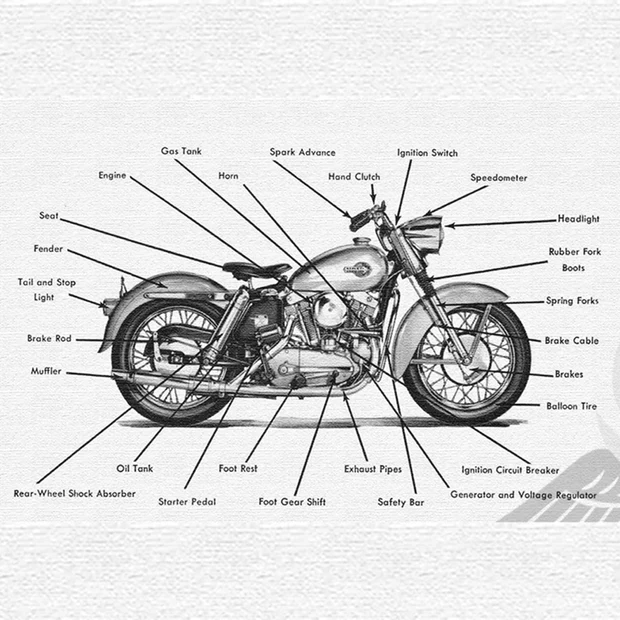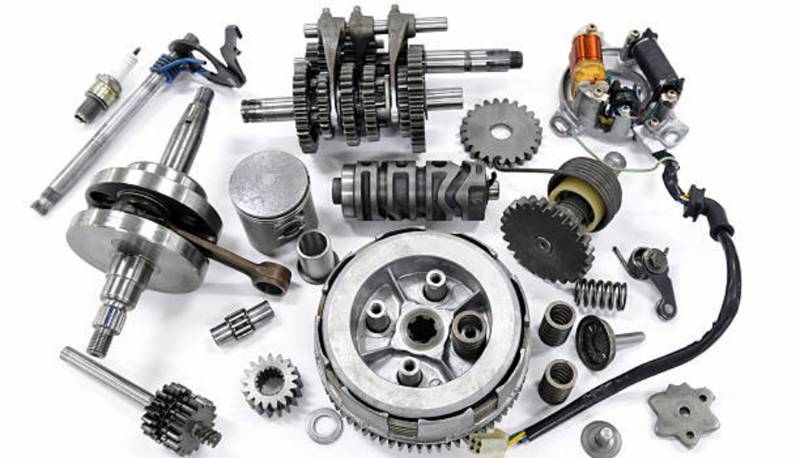Tips for Buying Trusted Bike Parts Wellington Online Without Regret
Tips for Buying Trusted Bike Parts Wellington Online Without Regret
Blog Article
Discover the Necessary Motorcycle Components You Need for Optimum Performance
Understanding the necessary parts of a motorcycle is essential for achieving peak efficiency. Each part, from the engine to the braking system, plays a critical role in total performance and security. Routine maintenance can stop unanticipated failings and improve the riding experience. Numerous bikers neglect the ins and outs of these systems. Finding exactly how they interact can lead to an extra effective adventure. What crucial elements should every cyclist prioritize?
The Engine: The Heart of Your Bike
The engine works as the core part of a bike, driving its efficiency and specifying its capacities. It is liable for converting fuel into power, which powers the bike forward. Different types of engines are employed, consisting of single-cylinder, V-twin, and inline arrangements, each offering distinctive features matched for various riding purposes and styles. The engine size, commonly gauged in cubic centimeters (cc), significantly affects performance, with bigger engines usually supplying even more power and torque.Furthermore, the engine's design and technology, such as fuel injection systems or air-cooling versus liquid-cooling, influence efficiency and integrity. Upkeep is important for peak procedure; aspects like routine oil modifications and monitoring stimulate connects assurance long life. Bikers commonly think about an engine's responsiveness and level of smoothness, as these features boost the total riding experience. Eventually, the engine remains a crucial component that defines not just the motorbike's performance however additionally the motorcyclist's link to the machine.
The Transmission: Shifting Gears Smoothly
The transmission plays a crucial duty in a motorcycle's performance, particularly in the mechanics of gear changing. Recognizing how to move equipments efficiently can boost the total riding experience, while normal maintenance assurances peak functionality. Appropriate attention to these facets can greatly affect the long life and effectiveness of the bike.

Gear Shifting Mechanics
Smooth equipment shifting is important for ideal motorbike performance, considerably affecting both velocity and control. The technicians of equipment changing involve the communication in between the clutch, equipment bar, and transmission system. When a biker involves the clutch, it disengages the engine from the transmission, permitting a gear change without damaging the components. A well-timed launch of the clutch, incorporated with precise activity of the gear lever, promotes a smooth change between gears. This process ensures that the engine runs within its ideal power band, enhancing efficiency. Motorcycle Spares Christchurch. Additionally, recognizing the gear ratios and their impact on speed and torque can assist cyclists make notified selections throughout shifts, ultimately adding to a more pleasurable and receptive riding experience
Maintenance Tips Relevance
Regular maintenance plays a necessary function in ensuring that the transmission system operates successfully, permitting smooth gear changes. On a regular basis examining and transforming the transmission liquid is important, as old liquid can bring about increased rubbing and wear. In addition, checking the clutch for wear guarantees peak interaction and disengagement, preventing slippage during gear changes. Lubrication of relocating parts is equally essential to decrease rubbing and enhance performance. Motorcycle owners should additionally monitor for leakages and uncommon noises, as these can indicate underlying problems. By adhering to these maintenance tips, riders can lengthen the lifespan of their transmission system, ensuring that gear changes remain seamless and contributing to the total efficiency of their motorcycle.
The Braking System: Ensuring Security on Every Ride
Braking systems are essential elements that straight affect a motorbike's safety and efficiency. They include various parts, consisting of brake pads, blades, calipers, and hydraulic lines, all working together to ensure efficient slowdown. The kind of stopping system-- generally either disc or drum-- influences responsiveness and stopping power.Regular maintenance is necessary to maintain peak efficiency; used brake pads can bring about reduced efficiency and enhanced stopping ranges. Additionally, the quality of brake liquid must be kept track of, as it can soak up moisture gradually, jeopardizing stopping efficiency.Riders should likewise consider the relevance of anti-lock braking systems (ABS), which protect against wheel lockup during abrupt stops, enhancing total security. Effectively functioning brakes are not almost quiting; they infuse self-confidence in the rider, allowing for safer navigation with various surfaces. Eventually, a dependable stopping system is critical for enjoying every adventure with assurance.
The Suspension: Enhancing Comfort and Control
A well-functioning shock absorber greatly contributes to a motorcycle's total efficiency, enhancing the performance of the stopping system. The suspension plays a substantial duty in soaking up shocks from uneven surface areas, ensuring a smoother ride while maintaining tire call with the road. This contact is essential for both stability and control, allowing cyclists to browse corners with self-confidence and precision.Different kinds of shock absorber, such as telescopic forks or mono-shocks, supply varying levels of convenience and handling. Properly tuned suspension enhances responsiveness, offering the rider with a more connected feeling to the motorbike. Normal upkeep checks are very important to ascertain the suspension components, consisting of springtimes and dampers, are working at their finest. A reliable suspension system not only boosts the riding experience but also adds to the long life of other motorcycle parts by lessening wear and tear. Because of this, purchasing high quality suspension is crucial for any type of severe motorbike enthusiast.
The Tires: Attaching You to the Roadway
Tires play an essential role in a motorcycle's performance, working as the key link between the road and the motorcyclist. Understanding the different kinds of tires available can greatly affect taking care of and safety and security. In addition, regular upkeep is essential to assure peak tire performance and longevity.
Tire Types Explained
How do different tire kinds influence a motorcycle's performance? Tire types play an essential function in figuring out a motorcycle's handling, stability, and hold. Sporting activity tires, designed for high efficiency, deal improved grip and responsiveness on paved roads, making them ideal for racing and hostile riding. On the other hand, touring tires prioritize resilience and convenience, supplying a smoother experience for long-distance travel. Off-road tires, identified by their tough walk patterns, excel in grip on unpaved surface areas, suitable for journey lovers. In addition, dual-sport tires blend attributes from both off-road and on-road categories, catering to flexible riding requirements. Eventually, selecting the ideal tire type is vital home for maximizing efficiency, making sure safety and security, and enhancing the total riding experience.
Maintenance Tips Offered
While riding when traveling, keeping excellent tire problem is vital for safety and performance. Frequently examining tire stress is important, as under-inflated tires can bring about poor handling read what he said and raised wear. It is advisable to evaluate walk depth often; worn tires compromise grasp and security. On top of that, riders should search for indicators of damage, such as bulges or cracks, which can suggest the need for substitute. Rotating tires periodically ensures even put on, enhancing durability. Maintaining tires tidy from debris and preventing extreme aesthetics can extend their lifespan. Lastly, preserving correct positioning and equilibrium adds to come to a head efficiency, lessening anxiety on various other bike elements. Sticking to these maintenance ideas will significantly enhance the total riding experience.
The Fuel System: Fueling Performance and Performance
The gas system plays a crucial duty in maximizing a motorcycle's efficiency and performance, as it assures the optimal distribution of gas to the engine. It makes up numerous vital parts, consisting of the gas tank, fuel pump, fuel filter, and fuel injectors or carburetor. Each component has to work properly to guarantee a smooth and effective ride.The fuel tank shops gasoline and supplies it to the engine by means of the gas pump, which creates the essential pressure. A gas filter stops contaminants from going into the engine, while the injectors or carburetor mix gas with air for combustion.Proper maintenance of the gas system is important; a clogged up filter or malfunctioning injector can bring about reduced efficiency and raised gas intake. By confirming that the gas system operates efficiently, motorcyclists can appreciate better throttle feedback, far better gas economy, and in general enhanced riding experience.
The Electrical System: Powering Your Experience
A reliable electrical system is vital for the general performance and safety and security of a motorcycle, as it powers vital parts such as the ignition, illumination, and numerous digital systems. This system consists of the battery, which shops power, and the generator, in charge of generating power while the engine runs. The wiring harness links these parts, guaranteeing trustworthy power distribution.Additionally, fuses protect the system from overloads, while relays help manage high-current gadgets with low-power signals. A well-maintained electrical system improves efficiency by making sure smooth beginnings and consistent procedure of lights and signals, crucial for cyclist exposure and safety.Regular checks of the battery's cost and links are vital for stopping electrical failings. Riders should additionally inspect wiring for deterioration, ensuring all elements function preferably. Inevitably, a robust electric system adds significantly to the overall performance and reliability of the motorcycle.
Regularly Asked Questions
How Often Should I Replace My Motorbike's Battery?
The regularity of motorcycle battery substitute webpage relies on usage and upkeep (Bike Parts Wellington). Normally, batteries should be changed every 3 to 5 years. Routine checks can aid determine when a replacement is necessary for peak performance
What Devices Do I Required for Standard Bike Maintenance?
For standard motorbike upkeep, one calls for important devices such as a socket set, wrenches, screwdrivers, pliers, tire stress scale, and a torque wrench. These tools help with efficient maintenance and ensure the bike runs efficiently and securely.
Just How Can I Boost My Bike's The rules of aerodynamics?
To enhance motorbike aerodynamics, one should think about changing fairings, using windscreen expansions, enhancing body setting, and minimizing general weight. These adjustments assist lessen drag, boosting stability and fuel performance during adventures.
What Are the Indicators of a Failing Electrical System?
Indicators of a failing electric system consist of lowering lights, problem starting, uneven instrument readings, and blown fuses. Oem Parts New Zealand. Uncommon smells or corrosion around battery terminals might likewise suggest underlying problems needing immediate focus for safety and security and efficiency

How Do I Select the Right Oil for My Motorcycle?
When picking oil for a motorcycle, one ought to take into consideration the manufacturer's specifications, thickness rankings, and the type of riding. Additionally, traditional versus artificial oil can affect performance and engine security, influencing the choice substantially. The engine size, commonly determined in cubic centimeters (cc), significantly influences efficiency, with larger engines usually supplying more power and torque.Furthermore, the engine's layout and modern technology, such as fuel shot systems or air-cooling versus liquid-cooling, impact efficiency and integrity. A well-functioning suspension system considerably adds to a motorbike's overall efficiency, complementing the effectiveness of the braking system. The gas system plays a vital role in optimizing a motorbike's performance and performance, as it guarantees the ideal delivery of fuel to the engine. A fuel filter protects against contaminants from going into the engine, while the injectors or carburetor mix gas with air for combustion.Proper maintenance of the fuel system is essential; a blocked filter or malfunctioning injector can lead to decreased efficiency and increased gas usage. A well-maintained electric system boosts efficiency by ensuring smooth begins and consistent operation of lights and signals, essential for rider presence and safety.Regular checks of the battery's charge and connections are crucial for protecting against electrical failures.
Report this page